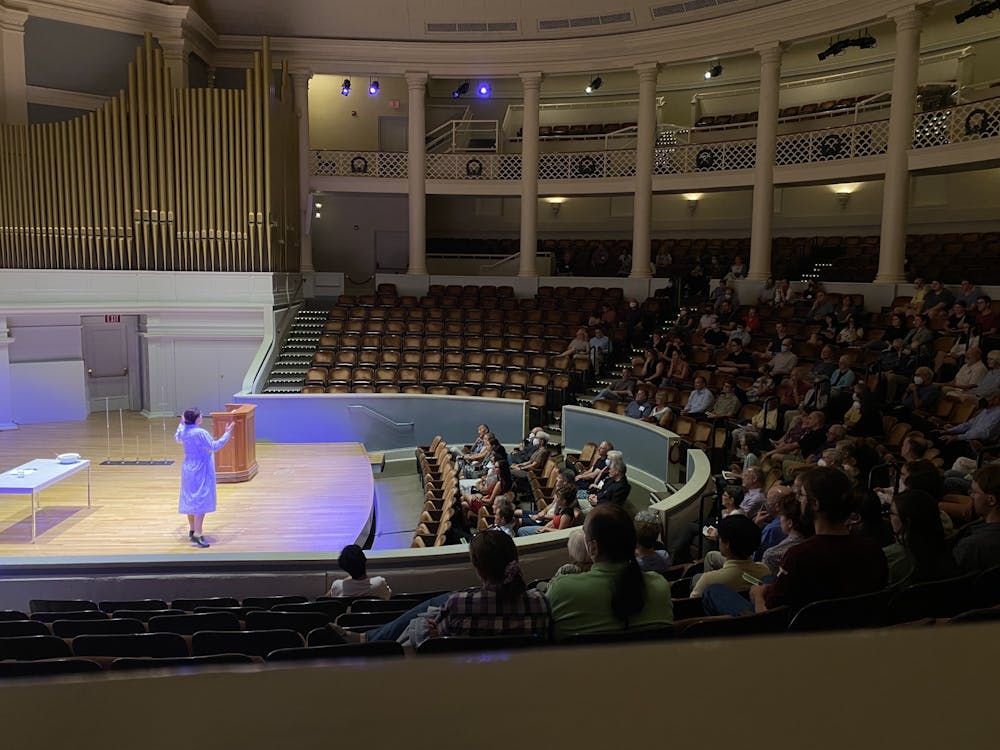Students, faculty and community members gathered inside Old Cabell Hall Thursday evening for a showing of “Diving Into Math with Emmy Noether,” a play depicting key events in the life of mathematician Emmy Noether.
The play — a co-production of portraittheather Vienna and Freie Universitat Berlin — discusses Noether’s upbringing relative to her passion for mathematics, the adversities she faced and overcame as a woman in STEM and her significant contributions to the field of mathematics.
The performance stars Austrian actress Antia Ziehler as Emmy Noether and was directed by award winning director Sandra Schueddekopf.
Thursday’s showing was offered free of charge to all members of the community thanks to the collective efforts of students within four University departments — mathematics, women, gender and sexuality, physics and history.
Opening remarks were presented by Ken Ono, department chair and professor of mathematics, and Laura Galloway, association dean for the sciences.
In his speech, Ono referred to Noether as a “genuine, real-life superhero.”
“A superhero is someone whose achievements are breathtaking,” Ono said. “A superhero is someone who overcame incredible barriers … whose story is food for thought and makes us better people.”
Galloway discussed the mathematician’s impact on the role of women in STEM.
“Noether’s contributions breakthrough and change the rigid educational system that was designed to keep women out,” Galloway said. “Her story offers hope and inspiration for students underrepresented in the STEM fields [and] offers significant food for thought for us today, as we face the many identity forces that divide us gender, sexuality, nationality and race, politics and so on.”
Galloway’s speech also highlighted the importance of Noether’s accomplishments to the field of mathematics.
“Without Emmy Noether, Einstein’s theories would be on shaky grounds,” Galloway said.
“Diving into Math with Emmy Noether” serves as a biographical presentation of both Noether’s struggles as a woman in 1930s academia and her ultimate successes in the field of mathematics.
The play began when Ziehler, as character “Emmy Noether,” entered the stage. “Noether” briefly paused at center stage, looked out into the audience and appeared surprised by the number of audience members that were attending her “lecture.”
The remainder of the play continued with Noether recounting her life experiences as though to a group of students, discussing many of the key moments and influences on Noether’s life ranging from a presentation of Noether’s early memories of her father Max Noehter, a well-known mathematician, to her death in 1935.
The play also depicted many of the adversities Noether faced as a woman in academia and as a German of Jewish origin who lived in Germany during the 1930s.
According to the play’s program, Noether began her studies in 1900 — at a time when women were just beginning to break through the barriers that prevented them from entering German universities.
Noether was only one of two women in a class of 986 students and was only allowed to audit, but not fully participate in, classes by the permission of her professors. In 1907, Noether published her thesis “On Complete Systems of Invariants for Ternary Biquadratic Forms,” which solved one of the central problems in Einstein’s Theory of Relativity.
Despite her accomplishments, Noether taught without pay at the University of Erlangen’s Mathematical Institute from 1908 to 1915.
In 1915, Noether returned to the University of Gottingen upon invitation from her former professor David Hilbert who fought for Noether to receive a professorship offer despite resistance from other faculty members.
Noether was ultimately permitted to teach at the University of Gottingen, but her lectures were always advertised under Hilbert’s name. Noether also never received an official professorship offer from the university.
During her time at Gottingen, Noether taught many graduate students and proved a theorem, now known as the “Noether Theorem,” which is widely applicable to contemporary physics and mathematics.
In 1932, Noether gave a plenary address at the International Congress of Mathematicians. Approximately 800 people attended the event, and only 21 individuals were invited to be plenary speakers.
A year later, Noether was dismissed from the University of Gottingen by the Nazi government and consequently accepted a faculty position at Bryn Mawr University. Shortly thereafter, she was invited to lecture at Princeton University — about which she remarked “the men’s university, where nothing female is admitted.”
Noether died the following year, 1935, after undergoing an operation to remove a cantaloupe sized ovarian tumor.
Today, Noether is considered one of the founders of modern algebra and her story has inspired individuals worldwide.
Graduate student Trevor Ford described the play as a moving experience.
“I liked the introduction of all the theorems at the end,” Ford said. “It kind of made me emotional with how much she was able to accomplish despite her hardships, and seeing it all laid out really hit home.”
For Ono, the play highlighted how Noether’s mathematical contributions have defined the course of history.
“If Emmy Noether had not been brought into the light … I don't think that I could fathom where [science] would be,” Ono said.







